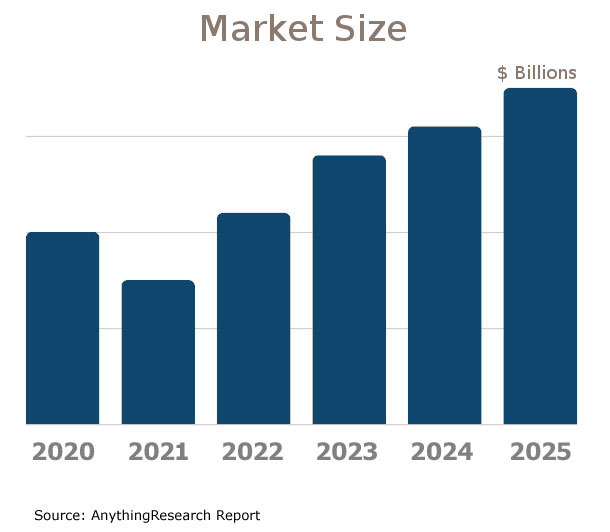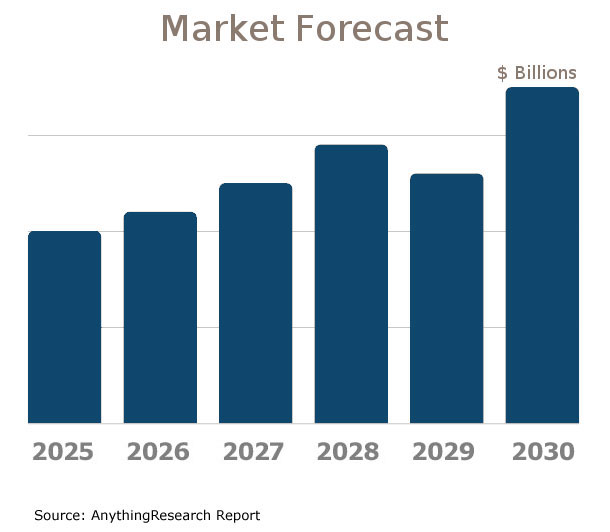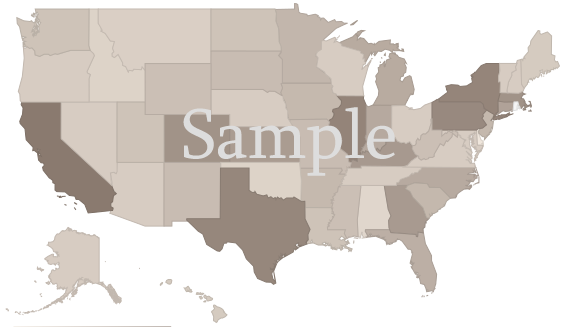| Standard Report | Premium Report | |
|---|---|---|
| Current State of the Industry |  |
 |
| Market Size (industry trends) |  |
 |
| Market Forecast (5-year projection) |  |
|
| Products/Services Breakdown |  |
|
| Revenue per State |  |
 |
| Financial Metrics |  |
 |
| Salary & Compensation Statistics |  |
 |
| Public Company Information |  |
 |
| Key Private Companies |  |
|
| Government Vendors |  |
|
| Instant Download - Available immediately upon purchase |  |
 |
Download both PDF and Excel


|
 |
 |
| Download now: |


2026 U.S. Industry Statistics & Market Forecast - Petroleum Bulk Stations and Terminals
Market Size & Industry Statistics
The total U.S. industry market size for Petroleum Bulk Stations and Terminals:
Industry statistics cover all companies in the United States, both public and private, ranging in size from small businesses to market leaders.
In addition to revenue, the industry market analysis shows information on employees, companies, and average firm size.
Investors, banks, and business executives use growth rates and industry trends to understand the market outlook and opportunity.

| Statistics | 2020 2021 2022 2023 2024 2025 | |
|---|---|---|
| Market Size (Total Sales/Revenue) |
Order at top of page | |
| Total Firms | ||
| Total Employees | ||
| Average Revenue Per Firm | ||
| Average Employees Per Firm | ||
| Average Revenue Per Employee | ||
Market Forecast
Market forecasts show the long term industry outlook and future growth trends. The following extended five-year forecast projects both short-term and long-term trends.

| Forecast / Industry Outlook | 2025 | 2026 | 2027 | 2028 | 2029 | 2030 |
|---|---|---|---|---|---|---|
| Market Forecast ($ millions) | ||||||
| Projected Industry Growth Rate (%) | ||||||
Industry Insights
Major trends affect the Petroleum Bulk Stations and Terminals industry include:- Increased regulatory scrutiny and environmental laws
- Shift toward renewable energy sources
- Advancements in technology and automation
- Fluctuating crude oil prices
- Infrastructure aging and need for modernization
- Efficiency improvements in logistics and transportation
- Growth in global energy demand
- Consolidation and mergers within the industry
- Impact of geopolitical tensions on oil supply chains
- Cybersecurity threats and need for improved safety measures
- Adoption of digital supply chain management tools
- Sustainability and corporate social responsibility pressures
- Expansion in emerging markets
Product & Services Breakdown
Research products and services in the Petroleum Bulk Stations and Terminals industry generating sales. Note that products are broken into categories with different levels of classification.| Product Description | Number of Companies | Sales ($ millions) | Percent of Total Sales |
|---|---|---|---|
Industry Total |
|||
Oil Well, Oil Field, Oil Refinery, And Pipeline Machinery, Equipment, And Supplies |
|||
Industrial Containers And Supplies |
|||
Grocery Specialties |
|||
Chemicals And Allied Products, Excluding Agricultural Chemicals, Plastics, Industrial And Natural Gases, Liquefied Petroleum (Lp |
|||
Biofuels, Including Ethanol, Methanol, Biodiesel, And Gasohol Not Included With Petroleum Products |
|||
Other Chemicals And Allied Products |
|||
Automotive Chemicals, Including Polishes And Cleaners, Fuel And Oil Additives, And Antifreeze |
|||
Refined Petroleum Products, Excluding Liquefied Petroleum (Lp) |
|||
Aviation Gasoline |
|||
Motor Gasoline |
|||
Special Naphtha |
|||
Jet Fuel, Naphtha Or Kerosene |
|||
No. 2 Distillate Fuel Oil, Including No. 2 Diesel And No. 2 Heating Oil |
|||
All Other Distillate Fuel Oil, Including No. 1 And No. 4 Diesel And Heating Oil |
|||
Residual Fuel Oil, Including No. 5 And No. 6 Heavy Diesel |
|||
Lubricating Oil And Greases |
|||
Liquefied Petroleum (Lp) |
|||
Crude Oil |
|||
Other Petroleum Products, Including Asphalt Binder, Road Oil, And Wax |
|||
Farm Supplies |
|||
Insecticides, Fungicides, And Pesticides |
|||
Other Agricultural Chemicals And Fertilizers |
|||
Seeds And Bulbs For Planting |
|||
Service Receipts And Labor Charges, Including Installed Parts |
|||
Miscellaneous Commodities |
|||
Pipeline Transportation Receipts |
|||
Rental And Operating Lease Receipts |
|||
U.S. Geographic Distribution: Revenue Statistics by State
Market Size by State ($ millions) indicates how the industry's competition is distributed throughout the country. State-level information can identify areas with higher and lower industry market share than average.
Income Statement (Average Financial Metrics)
Financial metrics provide a snapshot view of a benchmark "average" company. Key business metrics show revenue and operating costs. The data collected covers both public and private companies.| Industry Average | Percent of Sales (Industry Benchmark) |
|
|---|---|---|
| Total Revenue | Order at top of page |
|
| Operating Revenue | ||
| Cost of Goods Sold | ||
| Gross Profit | ||
Operating Expenses | ||
| Pension, profit sharing plans, stock, annuity | ||
| Repairs | ||
| Rent paid on business property | ||
| Charitable Contributions | ||
| Depletion | ||
| Domestic production activities deduction | ||
| Advertising | ||
| Compensation of officers | ||
| Salaries and wages | ||
| Employee benefit programs | ||
| Taxes and Licenses | ||
| Bad Debts | ||
| Depreciation | ||
| Amortization | ||
| Other Operating Expenses | ||
| Total Operating Expenses | ||
| Operating Income | ||
| Non-Operating Income | ||
| EBIT (Earnings Before Interest and Taxes) | ||
| Interest Expense | ||
| Earnings Before Taxes | ||
| Income Tax | ||
| Net Profit Net Income | ||
Financial Ratio Analysis
Financial ratio information can be used to benchmark how a Petroleum Bulk Stations and Terminals company compares to its peers. Accounting statistics are calculated from the industry-average for income statements and balance sheets.| Profitability & Valuation Ratios | Industry Average |
|---|---|
| Company valuation can be measured based on the firm's own performance, as well as in comparison against its industry competitors. These metrics show how the average company in the Petroleum Bulk Stations and Terminals industry is performing. | |
| Profit Margin Gross Profit Margin, Operating Profit Margin, and Net Profit Margin. Show company earnings relative to revenues. |
|
| Return on Equity (ROE) Return on Equity (ROE) is net income as a percentage of shareholders' equity. Shareholders' Equity is defined as the company's total assets minus total liabilities. ROE shows how much profits a company generates with the money shareholders invested (or with retained earnings). |
|
| Return on Assets (ROA) Return on Assets (ROA) is net income relative to total assets. The market research on Petroleum Bulk Stations and Terminals measures how efficiently the company leverages its assets to generate profit. ROA is calculated as Net Income divided by Total Assets. |
|
| Liquidity Ratios | Industry Average |
|---|---|
| Bankers and suppliers use liquidity to determine creditworthiness and identify potential threats to a company's financial viability. | |
| Current Ratio Measures a firm's ability to pay its debts over the next 12 months. |
|
| Quick Ratio (Acid Test) Calculates liquid assets relative to liabilities, excluding inventories. |
|
| Efficiency Ratios - Key Performance Indicators | Industry Average |
|---|---|
| Measure how quickly products and services sell, and effectively collections policies are implemented. | |
| Receivables Turnover Ratio If this number is low in your business when compared to the industry average in the research report, it may mean your payment terms are too lenient or that you are not doing a good enough job on collections. |
|
| Average Collection Period Based on the Receivables Turnover, this estimates the collection period in days. Calculated as 365 divided by the Receivables Turnover |
|
| Inventory Turnover A low turnover rate may point to overstocking, obsolescence, or deficiencies in the product line or marketing effort. |
|
| Fixed-Asset Turnover Generally, higher is better, since it indicates the business has less money tied up in fixed assets for each dollar of sales revenue. |
|
Compensation & Salary Surveys for Employees
Compensation statistics provides an accurate assessment of industry-specific jobs and national salary averages. This information can be used to identify which positions are most common, and high, low, and average annual wages.| Title | Percent of Workforce | Bottom Quartile | Average (Median) Salary | Upper Quartile |
|---|---|---|---|---|
| Management Occupations | 9% | Order at top of page |
||
| Chief Executives | 0% | |||
| General and Operations Managers | 4% | |||
| Business and Financial Operations Occupations | 6% | |||
| Sales and Related Occupations | 18% | |||
| Sales Representatives, Wholesale and Manufacturing | 14% | |||
| Sales Representatives, Wholesale and Manufacturing | 14% | |||
| Sales Representatives, Wholesale and Manufacturing, Except Technical and Scientific Products | 12% | |||
| Office and Administrative Support Occupations | 14% | |||
| Production Occupations | 5% | |||
| Transportation and Material Moving Occupations | 36% | |||
| Motor Vehicle Operators | 15% | |||
| Driver/Sales Workers and Truck Drivers | 15% | |||
| Heavy and Tractor-Trailer Truck Drivers | 8% | |||
| Material Moving Workers | 19% | |||
| Laborers and Material Movers | 17% | |||
| Laborers and Freight, Stock, and Material Movers, Hand | 8% | |||
| Stockers and Order Fillers | 7% | |||
Petroleum Bulk Stations and Terminals Competitor Landscape & Key Companies [PREMIUM]
The most influential companies in the Petroleum Bulk Stations and Terminals industry and adjacent industries either have large market share or are developing new business models and methods that could disrupt the status quo. We look at leading and emerging companies in the Petroleum Bulk Stations and Terminals industry and adjacent sectors:| Market Leaders: Direct Competitors Companies with the largest market share, focused in this industry |
Market leaders: Diversified Competitors Largest companies that have diversified operations in this and other industries |
| Innovators: Direct Competitors Innovative, Emerging, and Disruptive Companies that may influence the future direction of the industry. |
Innovators: Diversified Competitors Innovators and Disruptors in adjacent industries that may also affect the Petroleum Bulk Stations and Terminals industry. |
Latest Industry News
- India's 1st Private Cargo Terminal Opens in Gujarat - Dedicated Freight Corridor Corporation inaugurates first private cargo terminal in Gujarat, boosting logistics and promoting modal shift from road to rail. (07/09/2025)
- BP sells 300 Dutch petrol stations to Catom - BP has agreed to sell its 300 Dutch petrol stations to Dutch fuel distribution and trading company Catom as part of its plan to divest $20 billion worth of assets by 2027, BP said on Wednesday, without giving a deal value. (07/09/2025)
- Public comment open for proposed water discharge permit in Opelousas - The Louisiana Department of Environmental Quality is accepting written public comments on a proposed stormwater discharge permit for Buckeye Terminals in Opelousas. Comments are due by August 14. (07/09/2025)
- NPA Boosts Operational Efficiency With $1 Billion Port Rehabilitation Project - The Nigerian Ports Authority (NPA) has commenced the rehabilitation of the dilapidated facilities in the nation's seaports to improve operational efficiency.The move marks the readiness of the Managing Director/CEO, (07/01/2025)
- Ctg Port handles record 32.96 lakh containers in FY25, revenue hits Tk75,432 crore - Chattogram Port currently ranks 67th among the world's busiest ports, according to the Lloyd’s List, a London-based shipping publication (07/01/2025)
- Independent Oil Marketers Boost Supply As More Depots Slash Petrol Price Below Dangote’s Rate - Two fuel vessels arriving in Calabar and Warri are set to boost South-South supply, ease pressure, and intensify competition among independent petroleum marketers. (06/30/2025)
- Lies, liars and onlookers of a tragic drama - Lies and liars holding seats of power have created a world of disorder. What is going on between Israel and Iran over the last couple of weeks which has dragged US also into this costly drama will eventually put the last nail on the so-called rules-based world order coffin. (06/25/2025)
- Global Partners Needs To Improve Margins To Justify A Buy Rating - Global Partners has aggressively expanded via acquisitions, boosting scale but straining free cash flow and increasing leverage to speculative levels. Learn more on GLP stock here. (06/23/2025)
- Indian Oil to set up new POL terminal at Andaman & Nicobar amid rising fuel demand - Moneycontrol - State-run Indian Oil Corporation (IOC) is planning to set up a new POL (Petroleum, Oils and Lubricants) terminal in Andaman and Nicobar Islands, at a time when the fuel demand in the region is ... (06/12/2025)
- Petrocity Oil: Meet Owners of Petroleum Company Operating in Kenya, Uganda - Petrocity Oil, officially known as Petrocity Enterprises Limited, is a privately held oil marketing company based in Mombasa, Kenya. Aman Kurji serves as the MD. (05/24/2025)




